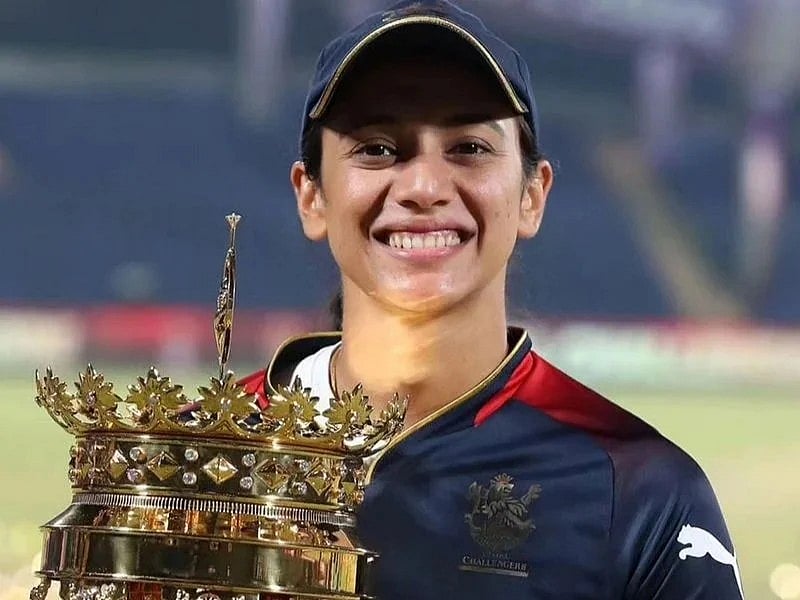There's more to Smriti Mandhana than her wedding drama: A look at the cricketing icon that India looks up to
Fixation on her postponed wedding has eclipsed what actually matters: she's great talent

Dubai: Scroll through your feeds and you’d swear Smriti Mandhana was starring in a messy web series, not reshaping India’s cricketing narrative. The fixation on her postponed wedding has eclipsed what actually matters: Mandhana is a generational talent, the most elegant left-hand batter of her era, and the only captain to ever deliver Royal Challengers Bangalore a title.
For a decade now, Smriti has been much more than the poster girl of Indian women’s cricket — she has been its foundation.
Born in Mumbai and raised in Maharashtra, she entered the sport almost by accident. As a nine-year-old, she tagged along to her brother’s practice sessions and mirrored his stance — except in reverse. A naturally right-handed child became a left-handed batter, and the rest of India would one day thank fate for that quirk.
By eleven, she was playing for the Maharashtra Under-19 side. Four years later, she smashed a century on debut in senior domestic cricket. Smriti’s rise was so steep it threatened to outrun her own age — a World Cup hundred, another in Australia, and a domestic double-ton before she even turned 20.
That kind of résumé would be once-in-a-lifetime for most athletes. For her, it was the teaser trailer.
Mandhana’s international breakthrough came in 2014 with a half-century on Test debut in England. It wasn’t flamboyant; it was foundational — proof that she belonged on the biggest stage. And when the 2017 World Cup rolled around, after months of rehabilitation from an ACL injury, she lit up the tournament with the kind of poise that makes selectors rethink strategies and rivals rethink bowling orders. It was the moment the cricket world stopped seeing her as young promise and started treating her as a problem.
Her career since then has been a masterclass in elegant aggression. She doesn’t bludgeon the ball; she caresses it. That famous cover drive — vertical bat, fluid wrist, perfect balance — is a highlight reel waiting to happen every time she walks out. It’s why leagues across continents fought to sign her: Australia’s WBBL, England’s The Hundred, and later the WPL in India. She doesn’t just participate in these leagues — she raises their commercial value.
Leadership followed naturally. In 2019, at just 22, she became India’s youngest T20I captain. That same year, she was crowned International Woman Cricketer of the Year at the CEAT Awards. She carried India to podium finishes at the 2022 Commonwealth Games and the 2023 Asian Games, becoming the anchor around which a generation of batters found confidence.
But if one moment defined her cultural power, it wasn’t a fifty or a hundred — it was the 2024 WPL final. Mandhana didn’t just lead the Royal Challengers Bangalore Women to a championship; she dragged an entire franchise out of its heartbreak era. Men’s teams came, stars came, posters came, hype came — but no trophy. Until her. She became the first captain in RCB history to lift silverware. In one season, she rewrote both her own legacy and the club’s mythology.
Which is why it is bizarre — almost insulting — to see the recent online frenzy reduce her to a gossip character. Yes, the sudden postponement of her wedding made headlines. Yes, it involved emotional stress and family health emergencies. But somewhere between reposted reels and breathless speculation, the public forgot they were talking about an athlete whose body has endured surgeries, training camps, long tours, and the pressure of a billion expectations. Her life is not a soap opera for the internet.
Smriti Mandhana is not an actress in your algorithmic rom-com. She is one of the finest cricketers India has produced. She is a once-in-a-generation opener, a leader who lifted an entire franchise on her shoulders, and a player whose grace with the bat changed the way millions watch the women’s game.
And it’s high time we remembered that.
Network Links
GN StoreDownload our app
© Al Nisr Publishing LLC 2026. All rights reserved.